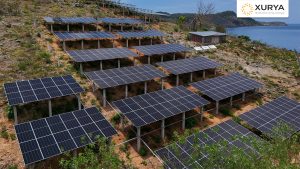
Source: National Energy Agency (DEN)
Jakarta – In the national energy transition strategy, the role of natural gas is one of the most important for meeting energy needs, said the National Energy Council (DEN) in a written statement, Tuesday (24/5). Natural gas is an energy source with lower carbon intensity than oil and coal, so it tends to be cleaner, according to the agency.
DEN member Satya Widya Yudha said that Indonesia, as one of the oil and gas producing countries in the world, should not be hasty in formulating an energy transition strategy, because the current national energy demand is still very high. According to calculations by the National Development Planning Agency (Bappenas), in 2045 Indonesia’s GDP will reach USD 29,000 per capita per year.
“This means that Indonesia will be included in the category of developed countries because it is in the top five GDP in the world,” said Yudha. Therefore, he continued, the current strategy is to continue to explore existing fossil energy but by using Carbon Capture and Storage/Carbon Capture, Utilisation and Storage (CCS/CCUS) technology.
Existing international commitments on the energy transition should not necessarily eliminate oil and gas, but still seek to reduce carbon emissions and meet national energy needs. Yudha explained that what needs to be emphasised in the energy transition is to find the right balance, so that oil and gas production can run and carbon emissions can be reduced according to the government’s target.
In the context of natural gas development, he reminded the government to provide the necessary infrastructure so that the supply of natural gas from producers to consumers in the country can be maximally absorbed.
“If there is a lack of infrastructure, it is estimated that there will be an excess supply of natural gas and then choose to export it. This condition is considered not to provide benefits to national energy needs,” he explained.
The General National Energy Plan as regulated in Presidential Regulation No. 22/2017 projects that the share of fossil energy in Indonesia’s energy mix in 2050 will be around 68.80 percent. Currently, the share of fossil energy in the energy mix is still around 89 percent, which is distributed over 38% of coal, 32% of oil, and 19% of natural gas.
Separately, the Executive Director of the Reforminer Institute, Komaidi Notonegoro, reminded that the energy transition requires preparation from many existing aspects. Therefore, all related matters need to be carried out in stages, so as not to become a burden on the economy and social life for the community in general.
He said, the use of natural gas for domestic purposes can be used as a bridge in implementing the energy transition in Indonesia. The “ultimate goal” of the energy transition policy is basically an effort to reduce emission levels, not merely replacing fossil energy sources with NRE.
“As a fossil energy source that is considered the cleanest, the portion of natural gas utilisation in the primary energy mix will automatically reduce the level of emissions in the energy sector,” said Notonegoro. (Hartatik)
Banner photo: New Energy Nexus (NEX) Indonesia, supported by the IKEA Foundation, has disbursed investment funds to four solar panel companies. (Source: NEX Indonesia)















